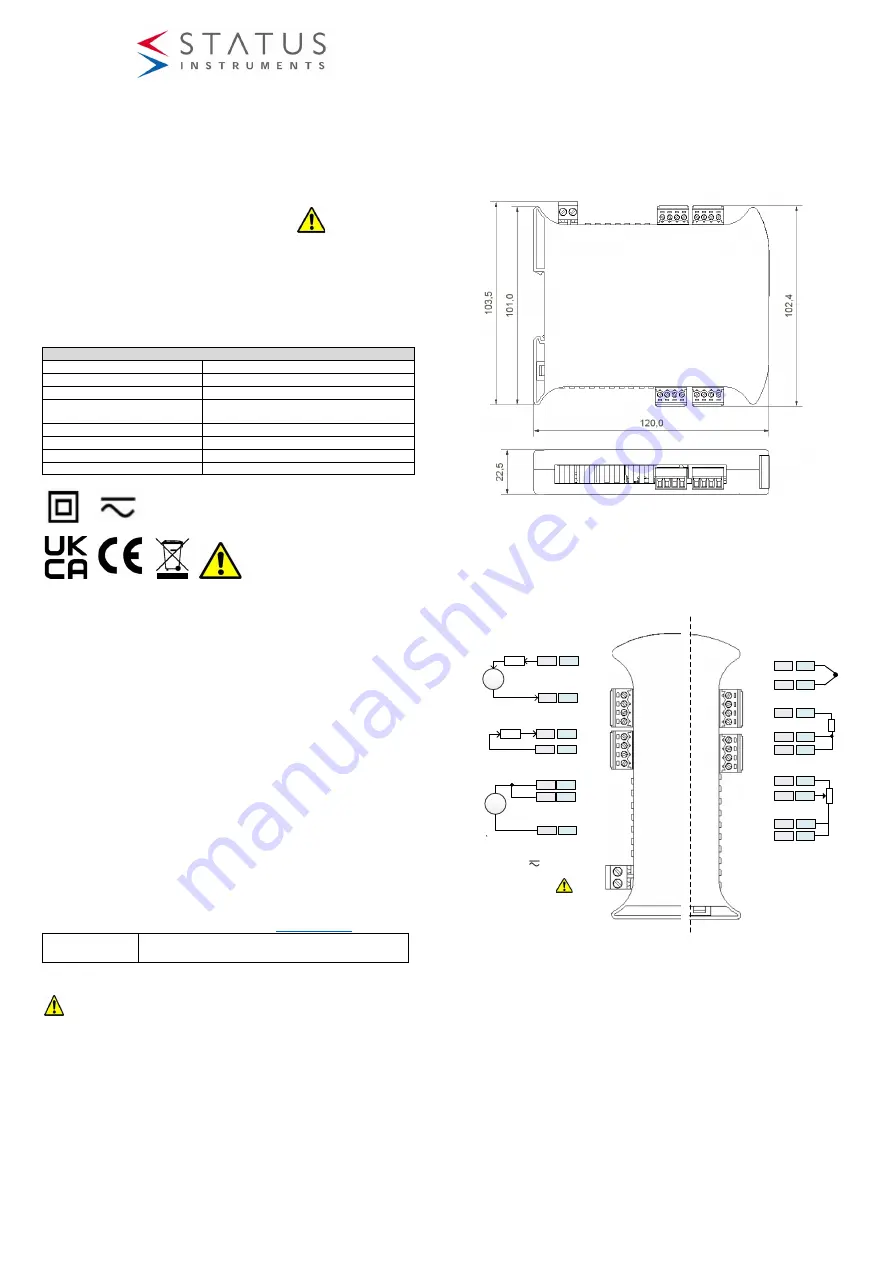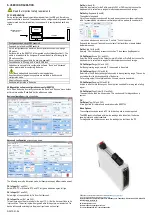
D2572-01-06
SEM1720
USER INSTRUCTIONS
Important - Please read this document before installing.
Every effort has been taken to ensure the accuracy of this document; however, we do
not accept responsibility for damage, injury, loss or expense resulting from errors and
omissions, and we reserve the right of amendment without notice.
IMPORTANT – CE, UKCA & SAFETY REQUIREMENTS
Product must be DIN rail mounted, inside a suitable enclosure providing environmental
protection to IP65 or greater.
To maintain CE EMC requirements, input and supply wires must be less than 30
metres.
The product contains no serviceable parts, or internal adjustments. No attempt must be
made to repair this product. Faulty units must be returned to supplier for repair.
Before attempting any electrical connection work, please ensure all supplies are
switched off.
ABSOLUTE MAXIMUM CONDITIONS (To exceed may cause damage to the unit).
Working voltage terminals Inputs
±24 Vdc @ 10 mA
Working voltage terminals Outputs
±30 Vdc @ 50 mA
Supply voltage
(20 to 240) Vac 50/60 Hz or (20 to 240) Vdc,3 W
Ambient
Temperature (-20 to 70) °C
Approvals EN61010_1, EN61326
External supply
1 A anti-surge fuse recommended
Isolation supply to input/output
4200 V
Any input to output
3750 V
Output to output, input to input
3750 V
Important – Read this
document before installing.
---------------------------------------------------------------------------------------------------------------
1~DESCRIPTION
.
SEM1720 is a dual channel signal conditioner designed to accept RTD, Thermocouple
or Potentiometer sensors and provide isolated, industrial process output signals in mA
or Volts. Each output channel may be linked to either an input sensor or to a maths
function of both sensor signals. This powerful feature allows the device to operate in
several different modes.
The output signal can also be adjusted over the full working ranges (0 to 20) mA or (0 to
10) V, to provide common or custom process signals, examples (4 to 20) mA, (0 to 1)
mA, (1 to 5) V.
SEM1720 is configured using the free software that allows the user to configure the
device without requiring calibration equipment. Maths functions on each channel can be
set up using the software as well as a 22-segment profile tool. Input/output simulation
tools for diagnostic purposes are also available
2~RECEIVING AND UNPACKING
.
Please inspect the packaging and instrument thoroughly for any signs of transit
damage. If the instrument has been damaged, please notify your supplier immediately.
3~SPECIFICATION.
Refer to data sheet for full specification. Download at
Factory defaults
Basic mode, dual channel operation, (Ch1, Ch2) = Pt100,
Range (0 to 100) °C = (4 to 20) mA output. Burnout high
4~INSTALLATION AND WIRING.
Important safety requirements
This
equipment is suitable for environment Installation category II pollution degree 1 and
is classed as "PERMANENTLY CONNECTED EQUIPMENT". The equipment is intended
for industrial and commercial application only and not suitable for domestic or medical
use.
The
equipment must be mounted inside an enclosure that provides protection >= IP65.
In NORMAL USE, the equipment will only be accessed for maintenance by qualified
personnel. Please ensure the equipment is mounted vertically with terminals (101 to 204)
at the bottom. This will provide maximum ventilation. This equipment may generate heat:
ensure the enclosure size is adequate to dissipate heat. Be sure to consider any other
equipment inside the enclosure.
The
equipment surfaces may be cleaned with a damp cloth. Use a mild detergent/water.
Ensure the supply is OFF before cleaning and on completion of cleaning the equipment
is completely dry before the supply is turned back ON.
This
equipment must be installed by a qualified person. All electrical wiring must be
carried out in accordance with the appropriate regulations for the place of installation.
DC
supply must be derived from a local supply and not a distribution system.
Supply
(20 to 240) Vac 50/60 Hz (20 to 240) Vdc. If supply is a HAZARDOUS VOLTAGE,
a supply isolation switch must be installed close to the equipment with
the “OFF”
position clearly marked.
Also, the supply must be fused with a suitable 1 A (T) fuse
(circuit breaker) installed close to the equipment.
USB
configuration can be performed without the supply being connected. For safety
reasons, use 24 Vdc for a functional test of the unit prior to fixed installation. The
following operations should only be carried out on a disconnected device and under
ESD safe conditions: General mounting, connection and disconnection of wires.
4.1~MECHANICAL.
The
equipment must be mounted on a DIN rail style DIN EN50022 inside a plastic or
metal enclosure with a protection level >= IP65. All wiring must be secured. Maximum
cable sizes 2.5 mm. Connection two-part screw terminals.
4.2~ELECTRICAL
CONNECTIONS
For
wiring connections, refer to the side label on the SEM1720 and this document.
SUPPLY
(20 to 240) V dc 50/60 Hz
(20 to 240) V dc
Max Power 3W
S1 -
S2 +
205
206
207
208
105
106
107
108
208
108
OUTPUTS
Vdc
LOAD
207
107
External Powered mA
+
-
207
107
205
105
Internal Powered mA
LOAD
207
107
Vout
206
106
Voltage Output
+
-
205
105
+
104
103
102
101
204
203
202
201
INPUTS
Thermocouple
203
103
204
104
+
-
RTD
202
102
203
103
203
103
201
101
Slide Wire
201
101
204
104
202
102
Input
connections for cable length >3 metres: use screen or twisted pair cables. Max
cable run 30 metres.
Output
connections for cable length >3 metres: use screen or twisted pair cables. For
current outputs max cable run 1000 metres, Voltage output 30 metres.
Supply
maximum cable run 30 metres. As stated in the IMPORTANT SAFETY
REQUIREMENTS the supply must be fused with a 1A (T) fuse and provision provided
to isolate the circuit when hazardous voltages are being switched.
LED front panel indication.
Channel 1 and channel 2 LEDs show green for in-range input condition.
Channel 1 and channel 2 LEDs show red for out-of-range input condition.




















